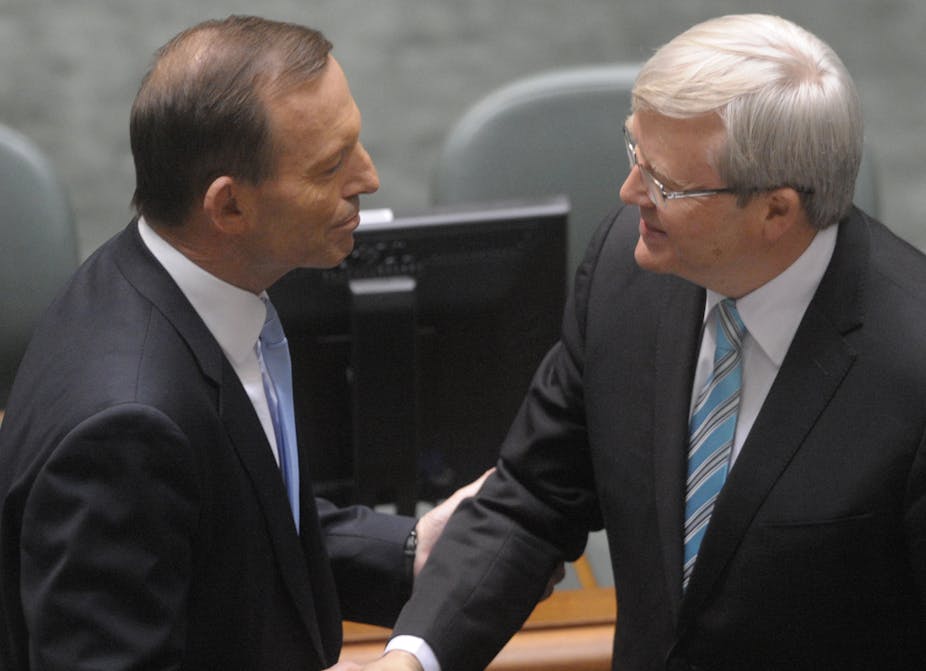In a recent lecture, Ross Garnaut argued that after decades of prosperity, Australians must now choose between two radically different approaches to our problems.
The choice is between a “business as usual” approach, which preserves the status quo, and a “public interest approach”, which requires that Australia change its minds, policies and actions when evidence supports change.
None of the political scheming observed in Canberra in recent times alters this analysis, or our choice. If anything, these events highlight a disregard for how the ever-changing policy proposals will affect the long-term public interest.
Of the business as usual and public interest approaches, the latter is the choice with the most wholesome long-term consequences. The latter is also the harder of the two. What choice will we make?
To be clear, this is not just the choice that the Australian electorate will make at the ballot box later this year. It is a much more serious choice about the type of society we want to become. It is a choice about the paths we are prepared to travel to bring this new society about.
These choices also raise questions about the quality of leadership we are prepared to support and provide space for. To answer these questions, we must curb our impulse to simply call for new or more ethical leaders. We are the proper objects of attention in this question.
Will we choose to afford change?
To understand questions around leadership, it is useful to employ the concept of affordance. An affordance is a quality of an object or an environment which allows an individual to perform an action. Environment includes the social environment, which is constituted by individual citizens and members of organisations and communities. All of us provide an affordance for certain types of social action, such as leadership.
According to Garnaut, Australian political culture has changed since the reform era between 1983 and 2000 in ways that make it much more difficult to pursue policy reform in the broad public interest. Specifically, Garnaut argues that our long period of prosperity has provided a congenial environment for the entrenchment of a new culture that elevates private over public interests and the short-term over the longer term.
This analysis suggests that Australian society provides little affordance for leadership for the common good - that is, for scientifically and ethically sophisticated leadership that enacts sustainable solutions to problems and strikes a balance between our immediate and longer-term interests.
If Australians value leadership that holds these qualities, then it is incumbent on all of us to provide an affordance for it. More directly, if we want high quality leadership, we must create the space for its emergence, entrenchment and diffusion.
Garnaut’s insight provides us with a welcome counterpoint to the sense of futility that we sometimes experience in the face of tough challenges. It reminds us that we are agents that can actively create and enact the social context within which social action and leadership occurs.
Creating social environments that provide an affordance for public interest approaches to our problems will not be easy. One reason for the entrenchment of a culture that privileges our private and immediate interests is that it is consistent with human nature—specifically our many unconscious biases.
As philosopher John Armstrong recently observed, this culture possesses the modest virtue of honesty about our preferences: society does value self-interest more than the public interest and the satisfaction of immediate over longer term needs. However, recognising our innate human tendencies, which are insidious and pervasive, does not mean that attempts to create a better society are futile.
Although the science of human nature is still in its infancy, it is now clear that human nature is malleable and contingent: nature is expressed via nurture. This should give us hope about how, as Armstrong puts it, to “combine friendship with our ordinary selves and the longing for noble ideals”.
A new concept of leadership
Australia needs new ideas about leadership that are grounded in this emerging understanding of who we are and our place in the world. Although it is not yet clear what these new ideas will look like, it is clear that the social context in which leadership is practised must be accorded more weight in any deliberations about the leadership we need.
We must act to create the space for high quality leadership that will provide an affordance for the expression of our better selves, which will, in turn, provide an affordance for high quality leadership, and so on.
However improbable the initiation, entrenchment and diffusion of such virtuous cycles may seem, it is not impossible. It does require, in the first instance, that we make a choice about how we approach our problems. Let us hope that we have the collective wisdom to make the more wholesome choice.

